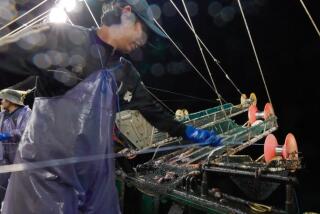Maine Canners Fight Northern Current
- Share via
LUBEC, Maine — “Never let a fish leave Maine with its head on,” and “Maine is on the move!”
Those are the slogans Gov. Angus King coined to symbolize the new ideas he promised to bring to government. But as it turns out, lots of Maine-raised salmon are on the move and leaving the state with their heads on so they can be processed in Canada.
“We sit here and watch the jobs go over there,” said Bob Peacock, gazing from the deck of his boat at the Cobscook Bay channel where boats carry away salmon to a Canadian factory to be gutted and packaged. “It drives us crazy.”
Peacock, 47, grew up on the top floor of his family’s fish cannery on a pier in Lubec, the easternmost town in the United States. Lubec bustled with more than two dozen smokehouses and canning plants until after World War II.
Today Lubec has barely 2,000 residents, and the main drag along its waterfront resembles a ghost town on a movie set. Several businesses are boarded up, and big gaps of empty shore appear where thriving factories once kept the local populace employed.
Peacock, whose factory processes farm-grown fish and is one of the few signs of vitality along Water Street, aims to turn things around. He has help in the state Capitol, where a gruff freshman legislator is pushing for a law to keep U.S.-raised fish from being shipped to Canada for processing.
“I’m here to make sure they have jobs,” Rep. Albion Goodwin said in Augusta as a hearing on his bill drew closer.
*
With its cold, deep, clean waters and powerful currents thrust by tides of up to 26 feet, Cobscook Bay has what some say are the best conditions in the world to raise Atlantic salmon, a popular fish in supermarkets and restaurants.
But all of the leases for aquaculture, or fish farming, on the productive U.S. side of the border are held by Canadian firms. Peacock said this results in part from U.S. restrictions on processing fish parts into feed, which allow Canadians to control that market. What riles Peacock and Goodwin most is that Canadians, they say, reneged on promises when they were granted the leases to have all fish raised in American waters processed on U.S. shores.
Peacock said the Canadians made the deal to appease American fishermen. Some of the companies, he added, have kept their promise to keep production in the United States.
But by his own count, Peacock said, a fifth of the 20 million pounds of salmon raised in Maine are going to New Brunswick processors. Gone with them are 40 jobs.
The governor’s marine resources commissioner, Robin Alden, said that at the most, 10% of the salmon produced in Maine waters is being processed in Canada, although she said she didn’t have solid figures.
Alden also said the Canadians promised to have all the Maine-grown fish prepared for market on the American side of the border, but that was not a condition of the leases. “It’s nothing anyone can hold anyone to,” she said.
The administration said the processing jobs should be returned to Maine, but does not think Goodwin’s bill is the way to do it.
Shirley Roach-Albert, a spokeswoman for one firm, Stolt Sea Farm Inc., said that the company has had to look for ways to cut costs and increase efficiency, which has meant processing more salmon at its St. George, New Brunswick, plant.
Roach-Albert said she is not aware of any written pledge by Stolt to keep jobs in the United States.
“But if it becomes evident a pledge was made, we certainly would try to honor that pledge if it makes economic sense,” she said.
*
Peacock’s plant, which employs 63 people, about half of them full-time, could take on much of the work. It has been refitted with the latest equipment, which can whack off hundreds of fish heads a day, skin and filet the salmon, measure out exact portions by weight, then bag and freeze them for market.
A flat-out ban on shipping aquaculture-raised fish to Canada for processing could violate the North American Free Trade Agreement, said Alden, the marine resources commissioner.
People in Lubec say they’re not interested in triggering a trade war, only in righting what they see as an injustice. And they are optimistic that the dispute can be resolved.
Mark Wagner, who lives in the Boston area and stays in Lubec on weekdays, is renovating the first of two dilapidated buildings he bought in town in anticipation of a revival of the local economy.
“I’m bullish on Lubec,” he said.
More to Read
Sign up for The Wild
We’ll help you find the best places to hike, bike and run, as well as the perfect silent spots for meditation and yoga.
You may occasionally receive promotional content from the Los Angeles Times.






